|
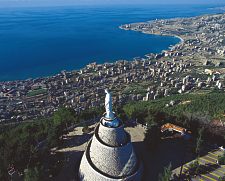
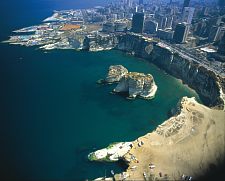
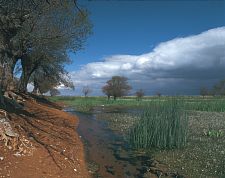

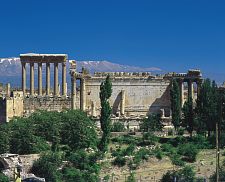
| |
Lonely leader amid swirling rumors
Bashar Assad is in a pickle, and has no easy way out
Sep 29th 2005 | DAMASCUS
Source:
The Economist | Story Background
THE capital looks stubbornly normal. Shoppers crowd its markets in the run-up
to the fasting month of Ramadan, which starts on October 4th. The biggest
downtown building to go up in years, a posh hotel, is set to open soon.
Opera-goers rave over a new musical, called “The Last Tale”, about a sad
misanthrope who kidnaps a singer in the hope that her song will cheer him out of
his gloom. But Syrians, who often complain that they are hostages to the ruling
regime, know they need to do more than sing to solve the troubles of their
president, Bashar Assad.
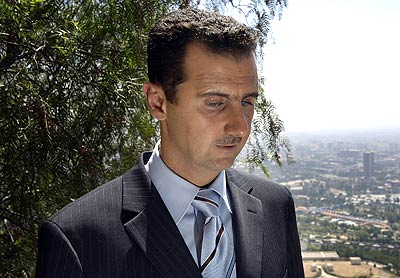 For
Mr Assad, and his clan and Baath party, face a crisis as grave as any since his
father, Hafez Assad, consolidated Syria's dictatorship 35 years ago. The regime
has survived big dangers before, from losing wars with Israel (which still
occupies Syria's Golan Heights), to a bloody insurgency by the Muslim
Brotherhood that was crushed in the 1980s. For
Mr Assad, and his clan and Baath party, face a crisis as grave as any since his
father, Hafez Assad, consolidated Syria's dictatorship 35 years ago. The regime
has survived big dangers before, from losing wars with Israel (which still
occupies Syria's Golan Heights), to a bloody insurgency by the Muslim
Brotherhood that was crushed in the 1980s.
Soviet backing and pan-Arab sentiment helped then. But Syria now has no friends
at all, except distant, non-Arab Iran. America, the sole superpower, has grown
overtly hostile, and sits right next door in Iraq; the Bush administration
accuses Syria of abetting jihadist infiltration of the Iraqi maelstrom, backing
groups that America deems terrorists, meddling in Lebanon and oppressing its own
people. America's ambassador in Iraq recently declared that “all options are
open” regarding how Syria might be punished. Influential Arab countries such as
Egypt and Saudi Arabia, which used to condemn such aggressive talk, have tired
of Syria's countering bluster and now shrug indifferently.
If it were just American chest-thumping, Mr Assad might feel secure. But a new
threat has rapidly emerged in Lebanon, the small neighbor that Syria is more
used to seeing as a playground, strategic buffer and, some would say, colony.
Last spring, the groundswell of anger after the assassination of a long-serving
Lebanese prime minister, Rafik Hariri, made Syria end its decades-long troop
presence, then obliged it to stand by as the Lebanese voted in a staunchly
anti-Syrian government.
The humiliation did not end there. The UN sent a special prosecutor, Detlev
Mehlis, to investigate the Hariri killing. The tight-lipped German recently had
four Lebanese security chiefs known for their closeness to the Syrian regime
arrested. Now, after much delay, Syria has submitted to his demand to question
their Syrian counterparts. That means not just those responsible for
intelligence in Lebanon, but also their bosses in Damascus, including, some say,
Mr Assad's brother, Maher, who commands the Republican Guard, and their
brother-in-law, Asef Shawkat, Syria's overall intelligence chief.
Mr Mehlis is not due to issue his findings until October 25th, and has said that
he has no Syrian suspects. Yet his presence at a heavily secured resort near
Damascus has caused much trepidation. Many Syrians assume he will finger top
regime figures; the main question is how high in the hierarchy, and how close to
the Assad family, the accusations will reach. Whatever it does turn up, Mr
Mehlis's investigation, backed by the clout of the UN Security Council, will
deeply embarrass Syria's government. Should there be proof of complicity or
worse, and should Syria fail to hand over suspects for trial, Mr Assad's
government is sure to be punished by further isolation, and an
internationalization of sanctions that are now unilaterally imposed by America.
Strains, not surprisingly, are showing at home. Internal opposition groups are
small, fractious and closely watched. But general resentment runs high, against
such ills as corruption, unemployment, sky-high house prices and the privileged
place of Mr Assad's Alawite sect, which makes up 15% of Syria's mostly Sunni
Muslim population. Sporadic unrest in the provinces has pitted restless Kurds,
Ismailis and Druze against police or against other sects.
Sunni extremists, who once refrained from attacks in Syria in recognition of its
support for Iraq's “resistance”, may have changed tactics. Gun battles between
such groups and police now break out regularly. Businessmen, many of them
Sunnis, complain they are tired of uncertainty. Cash is said to be flowing
rapidly abroad. At least one senior ousted member of the regime, a Sunni, is
said to be living in a plush hotel in Paris owned by the Hariris: that cannot
bring much comfort to former colleagues.
When Syria withdrew from Lebanon, Mr Assad tempered his embarrassment by
promising to speed reforms. Little has changed. The Baath party said it would
revise laws that hinder the emergence of rival political parties, but has taken
no measures to do so. The appointment of Abdullah Dardari, a respected non-Baathist,
as deputy prime minister with a mandate to open up Syria's stymied socialist
economy, was heralded as a breakthrough. But Mr Dardari's good intentions have
mostly been thwarted. Despite considerable public sympathy for Mr Assad, more
and more Syrians now reckon that his regime may not be capable of reform.
Intellectuals in Damascus contemplate three scenarios. One would see the regime
reaching a deal with America and the UN investigators, whereby some figureheads,
such as Syria's main intelligence chiefs in Lebanon, including their commander,
General Rostom Ghazale, would be sacrificed for trial, and Syria would comply
fully with America's other demands.
There are some signs of this. One observer detects the start of a “dance of the
seven veils”, with Syria grudgingly relinquishing positions long declared
sacrosanct. It has tightened controls along the Iraqi frontier, and told
Damascus-based armed Palestinian groups to lie low and back Mahmoud Abbas's
peace-inclined Palestinian leadership. In this scenario, Hizbullah, Lebanon's
Iran-backed Shia militia, may be the next offering. Syria's support has so far
insulated it from pressure to disarm, as required by the UN Security Council.
Should Mr Assad decide to appease the Americans, his regime might, in the words
of another Damascus observer, “lose some limbs but still be ambulatory.”
Scratches and bites, both lethal
But the other two scenarios offer Mr Assad a less rosy outlook. One is what a
dissident describes as “the cornered cat”: the regime chooses to lash out at its
tormentors. This could well lead to its rapid demise. Who might the inheritors
be? It is hard to tell whether various Islamist groups, such as the Muslim
Brotherhood, which was persecuted by Assad senior, are growing in strength. Some
close watchers think its potential exaggerated; others reckon it more likely
that military types may already be gaining ground inside Syria's institutions
and may make a lunge for power.
The last scenario, perhaps more likely, is “the cornered scorpion”. Surrounded
by fire, it stings itself. In other words, the regime would fall to an internal
coup. Who might the beneficiaries be? Infighting among the Assad family and
in-laws has been rumored. The president might have another go at chucking out
the powerful remainder of his father's old guard. Or the regime could turn
against the Assad family. Or, perhaps most bloodily, young Sunni officers could
turn against the minority Alawites who have held commanding posts in the army
and regime. If Mr Mehlis's report does, in effect, mean that Mr Assad is told to
sack some of his closest and most powerful advisers, or even put them on trial,
this last scenario would become more plausible. For the time being, the only
certainty is more uncertainty.
|